The Burrow

There are many ways to acquire a new pet, and adopting a rescue animal is a highly popular choice. Whether they’re adopted from a city council pound, an adoption agency or animal charity, adopting can give these animals a fresh start.
Adopting can also be a lot cheaper than buying from a pet store or a registered breeder, though depending on the animal’s history they may require a bit more care and patience as they’re introduced to their new home.
As pet insurance experts, we wanted to see just how many people adopt their pets, and what other ways people acquire a new furry friend. We surveyed more than 3,000 adults across Australia, the USA and Canada to find out.
Here are the results.
Over a third of owners surveyed said they adopted their pets, and this was highest in America. Almost 40% of American pets in our survey were adopted (39.7%), compared to 36.2% in Australia and 34.8% in Canada. This includes rescue groups, animal adoption centres, city council pounds and stray animals.
For American and Canadian pet owners, friends and family (which could also count as an adoption depending on the context) were the next top source of getting a new pet, followed by pet stores. In Australia, registered breeders were the second-most popular source (20.4%), closely followed by friends and family (19.4%).
The table below shows the ways pet owners have acquired their pets.
| Where did you get your pet from? | Australia | USA | Canada |
| Rescue | 36.2% | 39.7% | 34.8% |
| Friend/family | 19.4% | 26.3% | 24.7% |
| Pet shop | 16.4% | 20.1% | 15.1% |
| Registered breeder | 20.4% | 9.3% | 15.0% |
| Online marketplace | 6.7% | 2.39% | 7.9% |
| As a surprise gift | 1.0% | 1.7% | 2.2% |
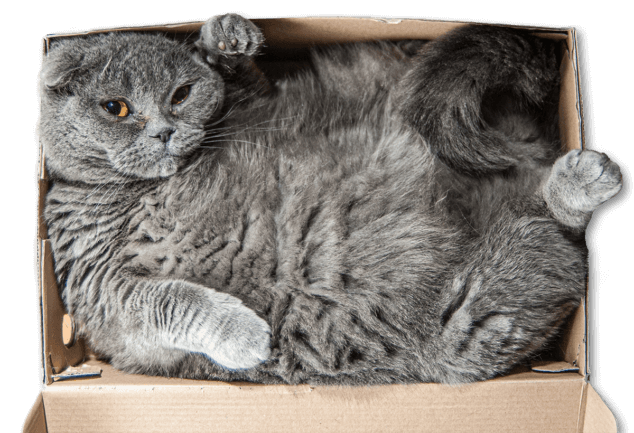
All pets are different, but there are specific traits and characteristics people will look for when they buy a new pet. In our survey, the most important characteristics were temperament, followed by size. This was true across all countries surveyed and accounted for roughly 50% or more pet owners.
Other important factors include the animal’s breed and whether the pet’s hypoallergenic or sheds.
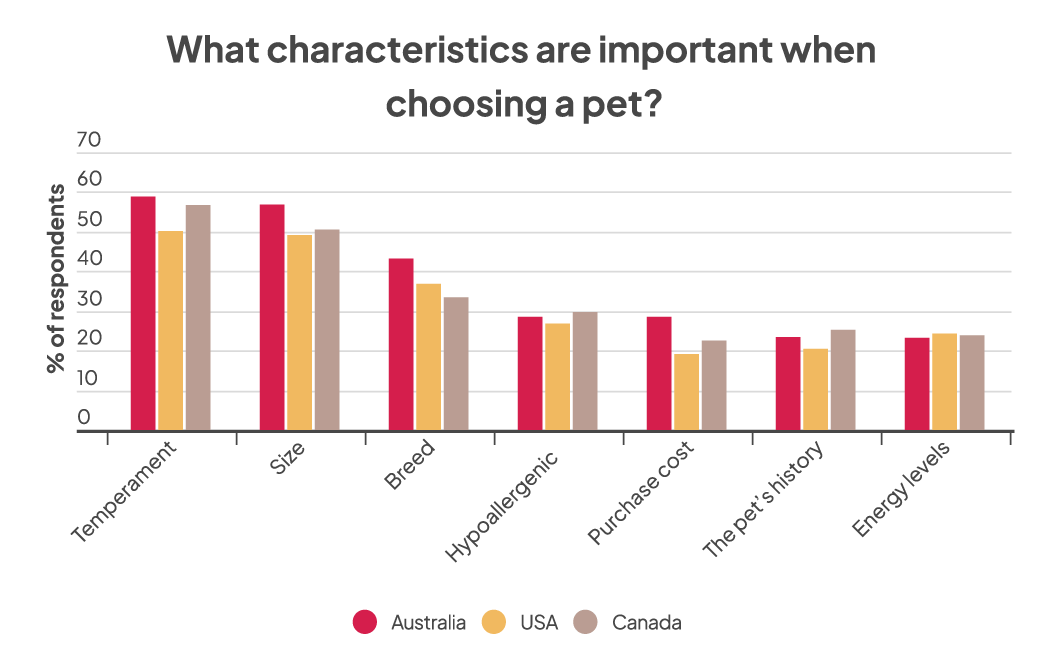
The majority of pet owners say their pets are mostly well behaved or extremely well behaved. Canada had the highest amount of extremely well behaved pets (36.7%), followed by the USA at 35.0% and Australia at 27.1%.
However, Australia had the highest amount of mostly well-behaved pets at 54.0%, followed by 48.1% in Canada and 46.4% in the States.
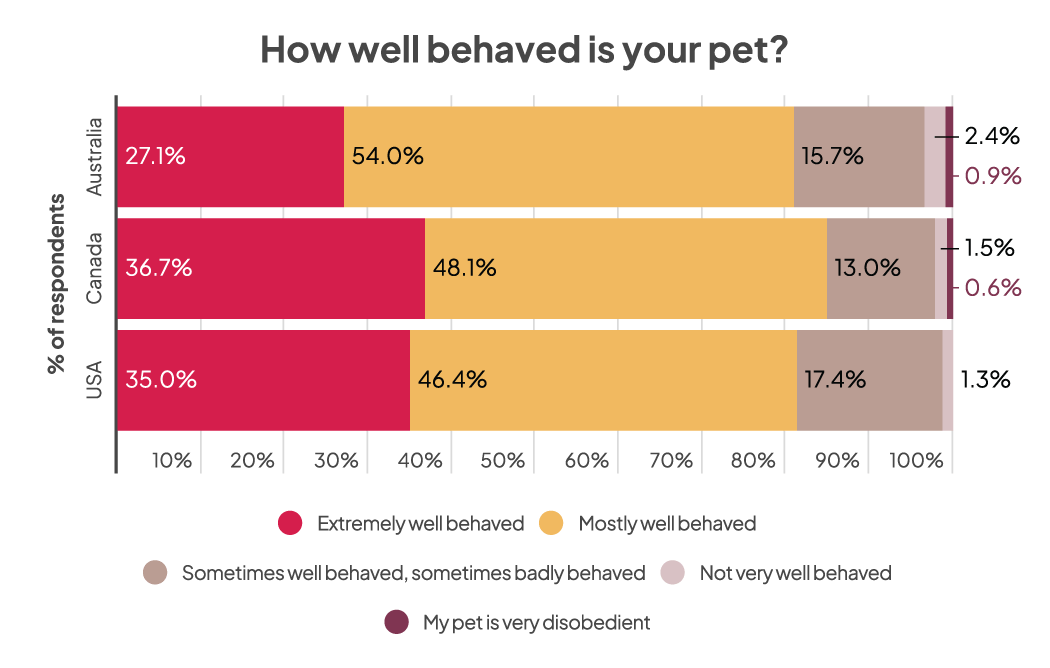
Very few pet owners reported that their pets were badly behaved. Australia had the highest number of pets behaving poorly, with 2.4% saying they were not well behaved and 0.9% saying they were very disobedient.
Canada was next with 1.5% saying their pets were not very well behaved, with an additional 0.6% saying their pets were very disobedient.
Only 1.3% of Americans said their pets were not very well behaved, and no American pet owners said they had a very disobedient pet.

There were some differences in each country when breaking down pet behaviour by the place the pet came from.
For example, in Australia pet shop pets were the most extremely well behaved (37.4%), while 25.6% of rescue pets were extremely well behaved. However, only 17.5% of pets from a registered breeder were classified as extremely well behaved by their owners.
In the USA it was a similar story, with more pet shop pets being classed extremely well behaved than rescue pets (41.4% to 31.8%), but more rescue pets were mostly well behaved than animals from a pet shop (52.5% to 34.2%). Interestingly, 53.8% of American pets that were a surprise gift were classed as extremely well behaved, which was quite different to the results in Australia and Canada.
In Canada, rescue pets and pet shop animals were equally extremely well behaved (41.6%), while pets from Facebook Marketplace or received as a surprise gift were the most likely to be mostly well behaved (56.6% and 53.3% respectively).
While it might be nice to receive a pet as a surprise gift, it might give you more than you bargained for. There was a clear trend across each country surveyed were pets received as a surprise gift were much more likely to be not very well behaved than other pets.
In Australia, surprise gift pets were over 10% more likely to be not very well behaved, while in Canada surprise gift pets were more than 12% more likely to be very badly behaved, and more than 4% more likely to be not very well behaved.
America had the smallest difference between pets received as a surprise gift or other means when it came to bad behaviour. Surprise pets were under 2% more likely to be not very well behaved in comparison to other animals.
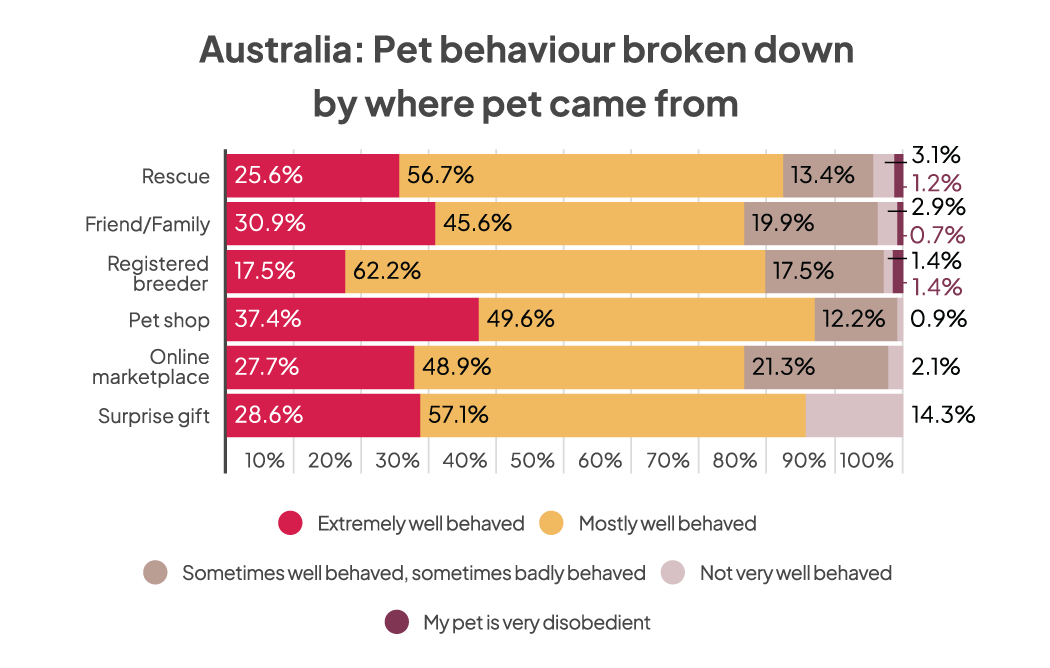
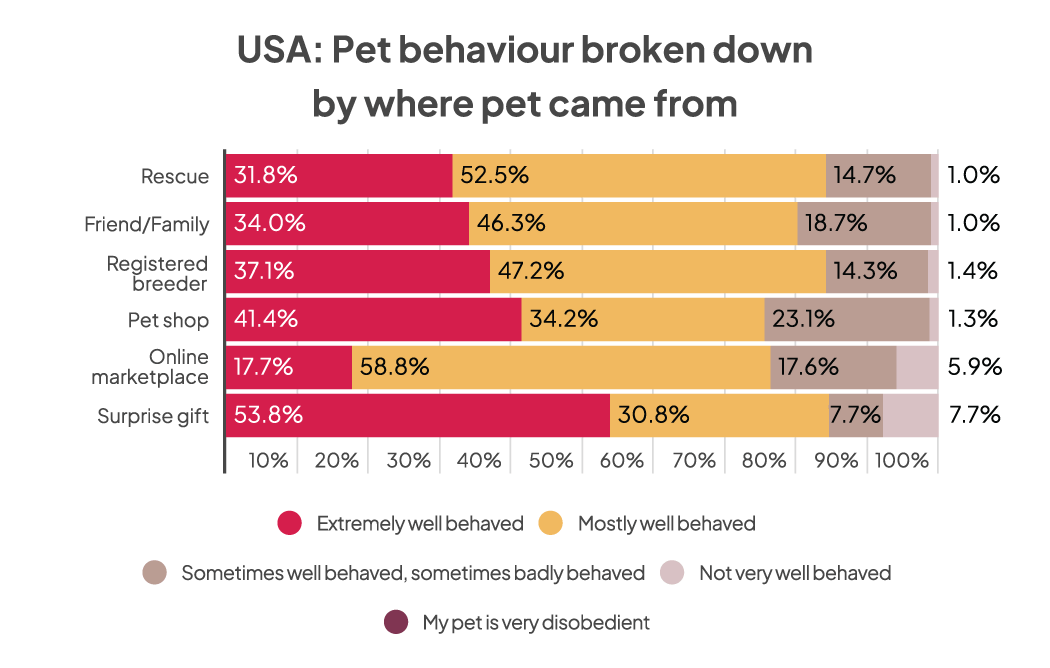
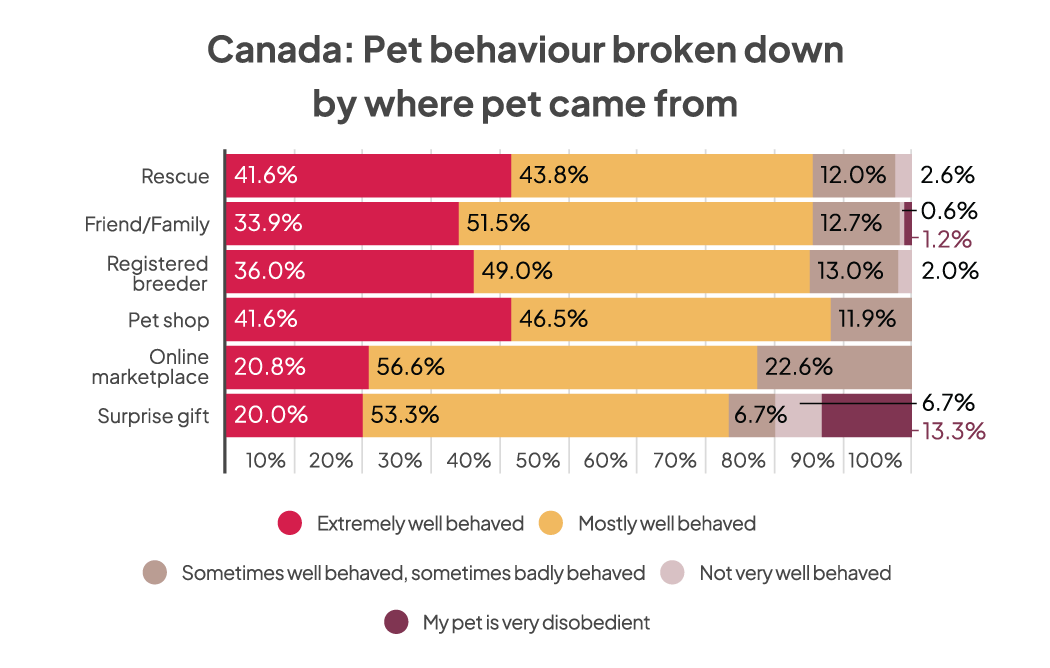
In Australia and Canada, cats were more likely to be extremely well behaved than dogs (30.0% vs 26.1% in Australia and 37.4% vs 35.2% in Canada), with dogs more likely to be mostly well behaved (54.5% vs 51.2% in Australia and 49.6% vs 46.1% in Canada).
It was the opposite in America, where dogs were more extremely well behaved than cats (38.4% vs 31.5%), and cats being more mostly well behaved than dogs (49.5% vs 40.9%).
However, across all three countries, cats were slightly more likely to be badly behaved than dogs, though only by a slim percentage difference.
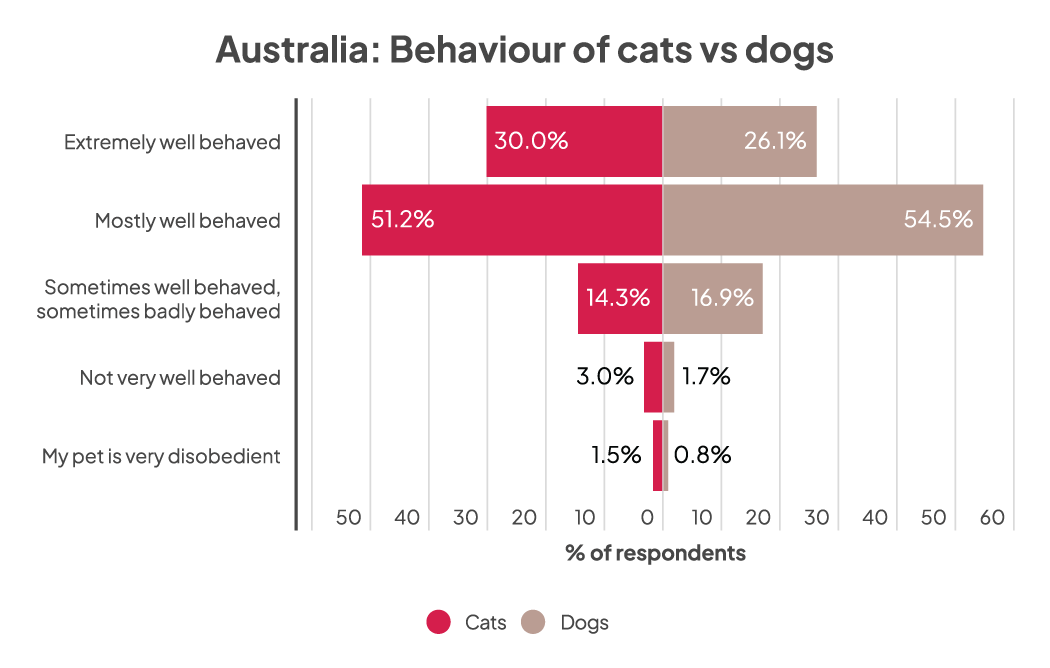
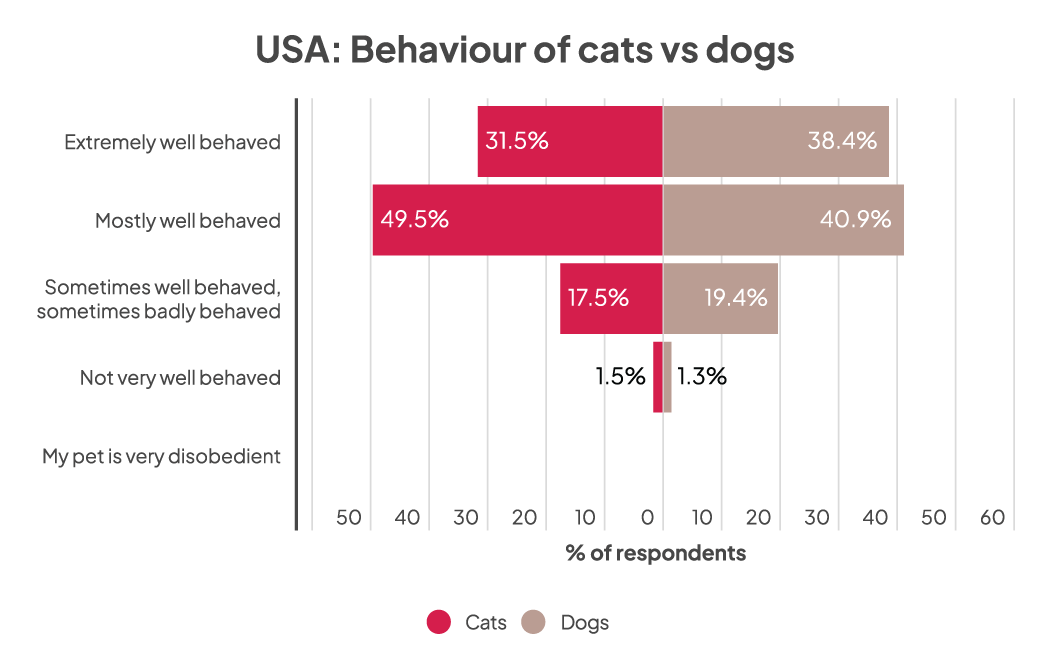
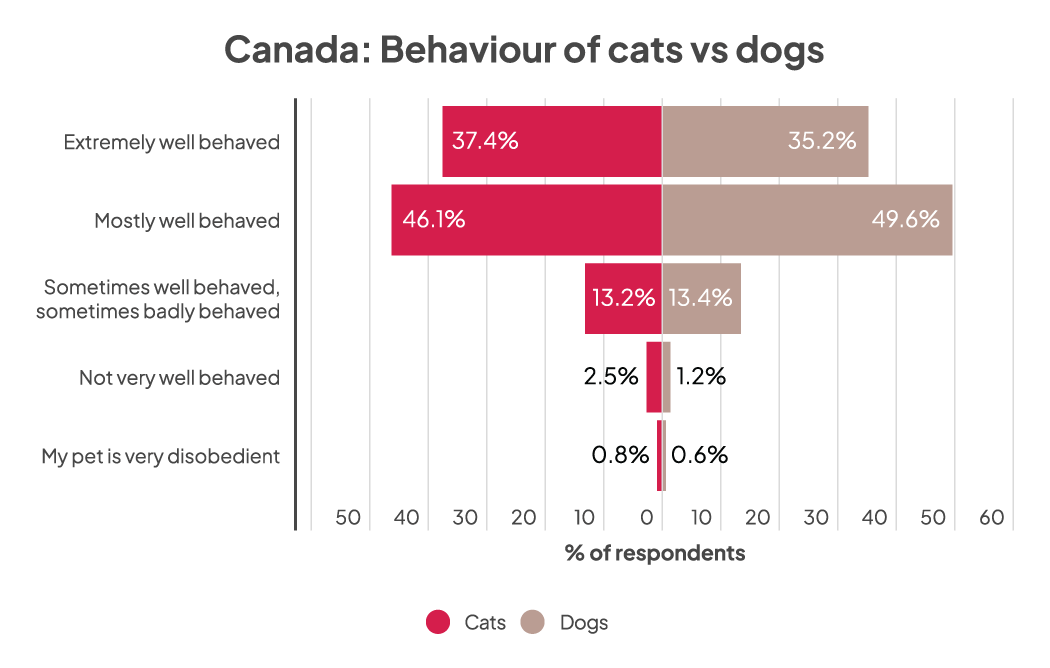
Some types of pet insurance can cover routine care costs such as routine check-ups, dental care, vaccinations, flea, tick and worming treatments, but also behavioural management classes.
Adrian Taylor, Executive General Manager of General Insurance at Compare the Market, explains this usually an optional extra on top-tier policies.
“Routine care and pet behaviour classes aren’t usually a standard inclusion, and are typically only available with comprehensive pet insurance policies. However, if you’ve got a new pet, such as a puppy, pet behaviour classes or puppy school can be invaluable for not only helping your new furry family member fit in, but equip you to manage all sorts of situations going forward,” Mr Taylor says.
“Keep in mind that these routine care extras also cover a variety of regular treatments and can help you take a proactive approach to caring for your pet and ensuring they’re in good health.”
Compare the Market commissioned PureProfile to survey 1,006 Australian, 1,012 Canadian 1,003 American adults in September 2023.